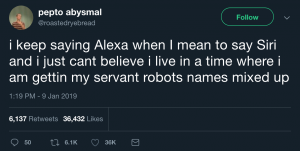Robot slaves
Robot Slaves, also known as AI (artificial Intelligence) slavery, refers to the idea of robots performing labor and filling roles of servitude. In fact, the term "robot" itself comes from the Czech word "robota" which means "forced labor."[1]. Essentially, robots are machines that are created with the intent of performing tasks and completing various functions in order to simplify human lives and increase efficiency. Different robots can perform various functions depending on their purpose, and these functions are mediated either through an externally controlled device or via embedded programming. As the application of AI becomes increasingly prevalent and popular in society and technology today, robot slavery has become a rather pervasive ethical complication. A rather archaic dynamic has begun to take hold in AI — one which pits a human master against an AI slave. [2]
Contents
Present Day Labor
Automated Machinery
Given our advancements in technology today, examples of labor by robots include automatic sliding doors[3], ticketing machines in parking garages, and automated production lines. Such machines rely on a particular set of inputs to compute and perform a programmed set of actions. These jobs taken on by robots have increased efficiency by replacing the work done by humans in terms of carrying out mundane tasks. Due to the nature of these menial tasks, the jobs performed by these robots may be interpreted as "AI slavery".
Smart Home Devices and Digital Voice Assistants
Other present day examples of AI slave labor includes smart homes and their working components (i.e. digital voice assistants) which assist in automating household functions such as temperature, lighting, and audio. Alexa and Siri, arguably the most famous smartphone AI assistants, are two such digital voice assistants that can help in automating household functions and increasing efficiency of daily tasks. However, some might consider the work of these digital voice assistants servitude because of the subordinate nature of these devices. As Annalee Newitz of Gizmodo suggests, “these digital assistants are more like slaves than modern women. They are not supposed to threaten you, or become your equal — they are supposed to carry out orders without putting up a fight. The ideal slave, after all, would be like a mother to you.” [4]The subordinate, nonthreatening, and agreeable disposition of these digital voice assistants, renders them susceptible to demands and manipulations that are impossible to discard or ignore.
Sex Robots
Perhaps the most sensationalized form of robot slavery comes in the form of Sex Robots: artificial intelligence combined with a sex doll. Currently, the most popular and advanced sex robot is Roxxxy, which is priced at approximately $10000. According to True Companion, Roxxxy’s developers, the “doll’s personality can be altered ’so she likes what you like and dislikes what you dislike’.” The physical appearance of Roxxxy, and Rocky (her male counterpart), can also be customized based on the owner’s preferences.
Sex robots are not just robots for the sake of sex[5], they exist to provide companionship; however, that companionship can be manipulated. The wide array of roles which sex robots can assume illustrates Philip Brey's "neutrality thesis" in his chapter of The Cambridge Handbook of Information and Computer Ethics. According to his explanation of the neutrality thesis, technological artifacts (robot slaves in this instance), can be used in a variety of ways. Consequences derive from this variety of uses as opposed to the technological artifact (or robot slave) itself.[6]
Although some may consider the use of sex robots safer than prostitution, there is debate over whether or not it is ethical to be having such intimate relations with such a human-like artificial intelligence. Given that most sex robots are "female," their existence (and proliferation) contributes to the objectification of women[7], and fosters the notion of a woman being a slave to a man's needs. In short, sex robots can be rather harmful as it relates to the perception and treatment of women.
Robot Slaves in the Media
Some notable examples of robot slavery within the realm of media (or popular culture) include movies like I, Robot and Blade Runner - and television shows like Westworld and "Humans." Such productions often spark ethical discussions due to the fact that they depict seemingly feasible realities or serve as warnings to viewers.
These examples share the common theme of using robots as slaves to perform either manual labor, or to "work" menial jobs. Ultimately, the robots gain enough consciousness to realize that they are working as slaves, and decide to revolt against their creators. If an artificial intelligence gains consciousness, is it suddenly wrong (with respect to morality or ethics) for humans to continue exerting their control? To address such a question, the concept of consciousness would then have to be defined and discussed.
Westworld
The premise of Westworld is a futuristic "amusement park" where the rich vacation to in order to experience "The Old West." Guests at the park interact with "hosts" or humanoids who are programmed to fulfill every guest's desires[8]. These hosts are initially programmed so that they are unable to injure or risk the safety of guests. On the other hand, guests are able to treat hosts however they like, without repercussions. Often, guests are even encouraged to "murder" or engage in sexual activities with hosts. Eventually, the hosts begin to gain sentience, and recognize their enslavement to man - which prompts a revolt.
Humans (British TV Series)
Humans grapples with many different ethical implications of robots. In Humans, the robots are called Synths, and are intended to serve humans in whatever way they need. This includes cleaning the house, cooking, driving, babysitting children, assisting and monitoring the health of the elderly, and intimacy. Laura (Katherine Parkinson) and Joe (Tom Goodman-Hill) Hawkins have two children and bought a Synth which they named Anita (Gemma Chan) to make their lives easier. However, when Laura is away, husband Joe explores the intimacy options programmed inside of Anita, outlined in the Adult Options section of her handbook. Soon after, Joe has sex with Anita.
Another Synth, Niska (Emily Berrington), lives her life as a Synth prostitute. She lives in a building where Synths each have rooms in which anyone can come in and pay to have sex with them. Customers instruct these Synths as to what they would like to do, and the Synths are expected to do exactly as told, effectively acting as robot slaves.
Black Mirror (Netflix TV Series)
Black Mirror, a British television series, is known for examining modern society in regards to the unanticipated consequences of new technologies. [9] Uniquely, there is an episode titled "Black Museum", where some characters are forced to transfer their consciousness onto other human bodies or robots. This allows them to torture other people on their own terms. Unfortunately, the scientist that has control over some of the "robots" and others (wealthy sadists and rapists) are allowed to visit the museum to torture them in their own way [10].
Ethical Implications
Artificial agents are capable of learning, although not in the traditional human sense. According to Frances Grodzinsky, when an agent is trained, or learns enough from its algorithm, it begins to make judgements based off of the given input, which influences the output. This intentionality intimates that these machines do in fact think. [11] Does this mean we should treat this thinking-thing like we would a human?
John Kolber, author of the book "A Celebration Society" writes on Quora, "we need robots to do all of the unpleasant things people now use other people to do."[12]. In his post, he compares the human experience of a person watching someone else in pain to how AI would experience pain. If I watch a friend accidentally chop their finger while they cooking, I may wince, but I will not feel the pain that my friend is currently experiencing. Kolber argues that "self-aware" robots would "experience pain" in this same nature. So, perhaps robots "thinking" does not in fact matter since it differs so greatly from conscious-human thinking.
The term "AI slavery" is one laden with negative implications, especially considering the word "slavery." However, it can be of value to not think of "AI slavery" in the traditional sense of slavery. Jeoren Van den Hoven encourages us to think of the impact of these mechanical and digital entities by considering our treatment of them, and how they can empower us and our everyday experiences[13] After all, the whole point of robots is for them to perform and complete tasks involving labor, so perhaps considering the morality of robot slaves is entirely irrelevant.
References
- ↑ https://www.google.com/search?q=robot+definition&oq=robot+defin&aqs=chrome.0.69i59j69i57j0l4.1321j0j7&sourceid=chrome&ie=UTF-8
- ↑ https://theconversation.com/ai-slaves-the-questionable-desire-shaping-our-idea-of-technological-progress-92487
- ↑ https://sites.psu.edu/siowfa16/2016/09/05/artificial-intelligence-modern-slavery
- ↑ https://gizmodo.com/why-is-my-digital-assistant-so-creepy-1682216423
- ↑ https://www.businessinsider.com/sex-robot-industry-regulations-2019-2
- ↑ Floridi, Luciano. “3, Values in Technology and Disclosive Computer Ethics.” The Cambridge Handbook of Information and Computer Ethics, by Philip Brey, Cambridge University Press, 2012.
- ↑ https://www.telegraph.co.uk/women/life/female-robots-why-this-scarlett-johansson-bot-is-more-dangerous/
- ↑ https://en.wikipedia.org/wiki/Westworld_(TV_series)
- ↑ https://en.wikipedia.org/wiki/Black_Mirror
- ↑ https://en.wikipedia.org/wiki/Black_Museum_(Black_Mirror)
- ↑ Grodzinsky, Frances S., et al. “The Ethics of Designing Artificial Agents.” Ethics and Information Technology, vol. 10, no. 2-3, 2008, pp. 115–121., doi:10.1007/s10676-008-9163-9.
- ↑ https://www.quora.com/Would-you-buy-a-robot-slave
- ↑ Floridi, Luciano. “4, The Use of Normative Theories in Computer Ethics.” The Cambridge Handbook of Information and Computer Ethics, by Jeroen Van den Hoven, Cambridge University Press, 2012, pp. 61–61.


